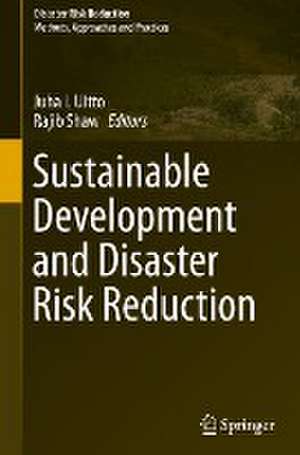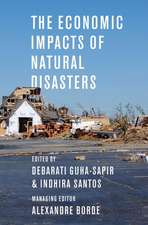Sustainable Development and Disaster Risk Reduction: Disaster Risk Reduction
Editat de Juha I. Uitto, Rajib Shawen Limba Engleză Hardback – 12 noi 2015
The primary target groups for the book are researchers, including graduate students, in the fields of environment and sustainable development, geography, disaster risk reduction, and climate change studies. The second target group comprises practitioners and policymakers working in national and international organizations, the private sector, and civil society.
| Toate formatele și edițiile | Preț | Express |
|---|---|---|
| Paperback (1) | 697.00 lei 6-8 săpt. | |
| Springer – 23 aug 2016 | 697.00 lei 6-8 săpt. | |
| Hardback (1) | 639.88 lei 38-44 zile | |
| Springer – 12 noi 2015 | 639.88 lei 38-44 zile |
Din seria Disaster Risk Reduction
- 18%
 Preț: 796.61 lei
Preț: 796.61 lei -
 Preț: 394.30 lei
Preț: 394.30 lei - 18%
 Preț: 790.46 lei
Preț: 790.46 lei - 15%
 Preț: 654.12 lei
Preț: 654.12 lei - 18%
 Preț: 967.08 lei
Preț: 967.08 lei - 24%
 Preț: 640.30 lei
Preț: 640.30 lei - 18%
 Preț: 1009.16 lei
Preț: 1009.16 lei - 18%
 Preț: 890.54 lei
Preț: 890.54 lei - 18%
 Preț: 942.94 lei
Preț: 942.94 lei - 15%
 Preț: 646.30 lei
Preț: 646.30 lei - 18%
 Preț: 782.24 lei
Preț: 782.24 lei - 18%
 Preț: 898.75 lei
Preț: 898.75 lei - 18%
 Preț: 956.33 lei
Preț: 956.33 lei - 18%
 Preț: 947.50 lei
Preț: 947.50 lei - 15%
 Preț: 643.34 lei
Preț: 643.34 lei - 24%
 Preț: 921.08 lei
Preț: 921.08 lei - 18%
 Preț: 951.91 lei
Preț: 951.91 lei - 18%
 Preț: 894.97 lei
Preț: 894.97 lei - 15%
 Preț: 641.85 lei
Preț: 641.85 lei - 18%
 Preț: 790.14 lei
Preț: 790.14 lei - 18%
 Preț: 729.18 lei
Preț: 729.18 lei - 18%
 Preț: 784.13 lei
Preț: 784.13 lei - 18%
 Preț: 783.50 lei
Preț: 783.50 lei - 18%
 Preț: 784.48 lei
Preț: 784.48 lei - 24%
 Preț: 699.00 lei
Preț: 699.00 lei - 15%
 Preț: 642.18 lei
Preț: 642.18 lei - 15%
 Preț: 651.51 lei
Preț: 651.51 lei - 18%
 Preț: 943.57 lei
Preț: 943.57 lei - 15%
 Preț: 649.54 lei
Preț: 649.54 lei - 24%
 Preț: 690.45 lei
Preț: 690.45 lei - 24%
 Preț: 899.55 lei
Preț: 899.55 lei - 18%
 Preț: 962.27 lei
Preț: 962.27 lei - 15%
 Preț: 652.17 lei
Preț: 652.17 lei - 15%
 Preț: 646.75 lei
Preț: 646.75 lei - 20%
 Preț: 587.30 lei
Preț: 587.30 lei - 15%
 Preț: 647.40 lei
Preț: 647.40 lei - 18%
 Preț: 957.75 lei
Preț: 957.75 lei
Preț: 639.88 lei
Preț vechi: 841.94 lei
-24% Nou
Puncte Express: 960
Preț estimativ în valută:
122.46€ • 127.37$ • 101.09£
122.46€ • 127.37$ • 101.09£
Carte tipărită la comandă
Livrare economică 11-17 aprilie
Preluare comenzi: 021 569.72.76
Specificații
ISBN-13: 9784431550778
ISBN-10: 4431550771
Pagini: 250
Ilustrații: XI, 287 p. 32 illus., 22 illus. in color.
Dimensiuni: 155 x 235 x 20 mm
Ediția:1st ed. 2016
Editura: Springer
Colecția Springer
Seria Disaster Risk Reduction
Locul publicării:Tokyo, Japan
ISBN-10: 4431550771
Pagini: 250
Ilustrații: XI, 287 p. 32 illus., 22 illus. in color.
Dimensiuni: 155 x 235 x 20 mm
Ediția:1st ed. 2016
Editura: Springer
Colecția Springer
Seria Disaster Risk Reduction
Locul publicării:Tokyo, Japan
Public țintă
ResearchCuprins
Introduction.- Sustainable Development, Climate Change Adaptation and Disaster Management.- Risk and Vulnerability.- Building Urban Climate Resilience: Experiences from Vulnerability Assessment in Hue city, Viet Nam Resilience, Transition and Transformation.- Climate Change Risks – Methodological Framework and Case Study of Damages from Extreme Events in Cambodia.- Food security, climate change adaptation and disaster risk.- Human Health as Pre-conditioning Nutrition towards Achieving Sustainable Development.- Ecosystem-based Disaster Risk Reduction: Experiences, Challenges and Opportunities in the Post-2015 Development Agenda.- Access, equity and hazards: Highlighting a socially just and ecologically resilient perspective on water resources.- Sustainable Development and Coastal Disasters: Linking Policies to Practices.- Climate Change and Integrated Approach to Water Resource Management in the Murray-Darling Basin.- Vulnerability and Sustainable Development: Issues and Challenges fromthe Philippines’ Agricultural and Water Sectors.- Community-based approaches to sustainable development and disaster risk reduction.- Education, Training and Capacity Building for Sustainable Development.- Missing the Forests for the Trees? Assessing the Use of Impact Evaluations in Forestry Programmes.- Integration of Indigenous Knowledge into Disaster Risk Reduction and Management (DRRM) Policies for Sustainable Development: The Case Of The Agta In Casiguran, Philippines.- Usefulness of a Sustainability Literacy Test.- Sustainable development and disaster risk reduction in post-2015.
Notă biografică
Juha I. Uitto
Juha Uitto is the Director, Independent Evaluation Office of the Global Environment Facility (GEF). His career has combined positions in international organizations and academia, including the United Nations Development Programme (UNDP), United Nations University (UNU), International Fund for Agricultural Development (IFAD) and the Nordic Africa Institute. He is Visiting Professor at Rutgers – The State University of New Jersey, and has held short-term visiting positions at the Graduate School of Global Environmental Studies, Kyoto University, in 2005 and 2013. His research interests pertain to assessing and measuring the effects and impact of environmental interventions, and he has written extensively on topics related to environment-poverty linkages, natural resources management, environmental hazards, and evaluation. A geographer by training, he holds a PhD from the University of Lund and MSc from Helsinki University.
Rajib Shaw
Rajib Shaw is a Professorin the Graduate School of Global Environmental Studies of Kyoto University, Japan. He worked closely with the local communities, NGOs, governments and international organization, including United Nations, especially in the Asian countries. He is currently the Chair of the United Nations Asia Regional Task Force for Urban Risk Reduction, and the President of Asian University Network of Environment and Disaster Management (AUEDM). His research interests are: community based disaster risk management, climate change adaptation, urban risk management, and disaster and environmental education. He has published several books in the field of disaster and environmental management. He is also the Chief Editor of Asian Journal of Environment and Disaster Management.
Juha Uitto is the Director, Independent Evaluation Office of the Global Environment Facility (GEF). His career has combined positions in international organizations and academia, including the United Nations Development Programme (UNDP), United Nations University (UNU), International Fund for Agricultural Development (IFAD) and the Nordic Africa Institute. He is Visiting Professor at Rutgers – The State University of New Jersey, and has held short-term visiting positions at the Graduate School of Global Environmental Studies, Kyoto University, in 2005 and 2013. His research interests pertain to assessing and measuring the effects and impact of environmental interventions, and he has written extensively on topics related to environment-poverty linkages, natural resources management, environmental hazards, and evaluation. A geographer by training, he holds a PhD from the University of Lund and MSc from Helsinki University.
Rajib Shaw
Rajib Shaw is a Professorin the Graduate School of Global Environmental Studies of Kyoto University, Japan. He worked closely with the local communities, NGOs, governments and international organization, including United Nations, especially in the Asian countries. He is currently the Chair of the United Nations Asia Regional Task Force for Urban Risk Reduction, and the President of Asian University Network of Environment and Disaster Management (AUEDM). His research interests are: community based disaster risk management, climate change adaptation, urban risk management, and disaster and environmental education. He has published several books in the field of disaster and environmental management. He is also the Chief Editor of Asian Journal of Environment and Disaster Management.
Textul de pe ultima copertă
This book focuses on exploring the linkages between natural disasters and sustainable development at the global, regional, and national levels. Disasters and development are closely related, yet the disciplinary silos prevail and there is little communication and cooperation between the disaster management, environment, and development communities. One catastrophic event, such as an earthquake, tsunami, or cyclone, can destroy infrastructure, people’s lives and livelihoods, and set back development. Similarly, slow onset disasters—often associated with global climate change—pose threats to development, livelihoods, food security, and long-term sustainable development. This book is uniquely aimed at bridging the gaps between the environmental, development, and disaster management communities. It traces the evolution of concepts and practice and highlights the linkages between natural disasters and sustainable development in key sectors, including food security, health, and water. Thebook includes case studies from the field highlighting the complex issues that challenge sustainable development and disaster risk management in practice. It draws policy conclusions for the global community based on state-of-the art knowledge from research and practice.
The primary target groups for the book are researchers, including graduate students, in the fields of environment and sustainable development, geography, disaster risk reduction, and climate change studies. The second target group comprises practitioners and policymakers working in national and international organizations, the private sector, and civil society.
The primary target groups for the book are researchers, including graduate students, in the fields of environment and sustainable development, geography, disaster risk reduction, and climate change studies. The second target group comprises practitioners and policymakers working in national and international organizations, the private sector, and civil society.
Caracteristici
Highly topical in light of climate change and increased losses due to natural disasters Timed to coincide with the launch of post-MDG sustainable development goals after 2015 Conceptually unique, bridging disciplinary boundaries Appeals to academics, graduate students, policy-makers and practitioners




